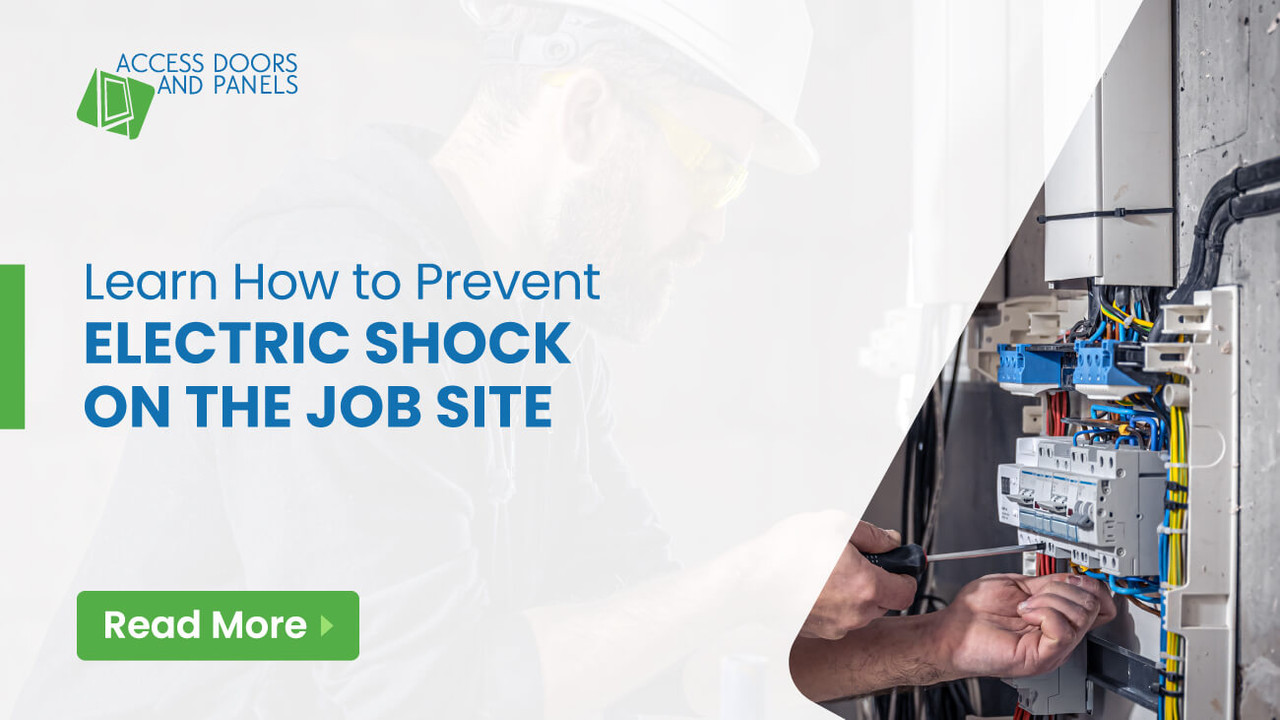Learn How to Prevent Electric Shock on the Job Site
Posted by Access Doors and Panels on 29th Nov 2023
Your construction crew's safety is paramount, and one of the most pressing concerns on any job site is protecting them from the ever-present threat of electric shock. It's a responsibility that cannot be overstated. The National Fire Protection Association (NFPA) reports that over 70% of electrocution incidents involving workers take place within the construction industry. The stakes are high, but so is the potential for prevention.
This article will review essential safety measures to safeguard your team from electric shock on the job site. We understand that safety is not just a box to tick; it's an ongoing commitment to the well-being of your crew and the success of your projects.
Compliance with Safety Standards
Compliance with OSHA and NFPA electrical safety standards, is not just a legal requirement but a critical step in ensuring the safety of your crew. These standards are meticulously designed to mitigate the risks of electric shock and other electrical hazards on construction sites. Training ensures every worker understands the importance of adhering to safety standards like OSHA (29 CFR 1926 subpart K) and NFPA electrical safety standards (NFPA 70E). These standards aren't just bureaucracy; they're your crew's shield against electric shock and other electrical hazards. Compliance is non-negotiable, and it should be instilled in every member of your team.
Navigating Electric Lines
While avoiding electric lines whenever possible is the safest course of action, there are scenarios where proximity is inevitable, especially in utility or construction work. The key is ensuring that your workers are well-informed about the precise locations of these lines. Knowledge is power, and this knowledge should be coupled with strict adherence to safe distances. In high-risk areas, consider limiting access to essential personnel only.
Cable Selection and Inspection
The backbone of electrical safety lies in the cables you use. Thick and resilient cables with impeccable insulation are your allies. Over time, cables can wear and tear, potentially compromising their insulation. Frequent inspections are non-negotiable, and any signs of deterioration should trigger a cable replacement.
Enhancing Safety with Conduits
Sometimes, more than basic insulation is needed. Invest in protective conduits to provide an extra layer of defense. These conduits act as a formidable shield against electrical hazards, offering enhanced protection for your workforce.
The Power of Proper Grounding
Proper grounding is a cornerstone of electrical safety. It establishes a low-resistance path connecting to the earth, preventing the buildup of voltages that can lead to accidents. Grounding every piece of electrical equipment is an essential step in protecting your team from electric shock.
Idle Machines and Lockout/Tagout
When machinery is not in use, power it down. Idle machines are often overlooked sources of electrical hazards. Implement lockout/tagout measures to protect workers from unexpected accidents during maintenance or when equipment is idle.
Extension Cords: Safety First
Extension cords demand meticulous handling. Unless you're a qualified electrician, avoid plugging two extension cords together, which can pose significant risks to workers. Additionally, refrain from nailing extension cords to surfaces, as this practice introduces unnecessary hazards.
Stay Dry, Stay Safe
Water and electricity don't mix well. Working in wet conditions is a recipe for disaster. Keep electrical equipment clear of wet surfaces, and never handle electrical equipment with wet hands.
Circuit Protection: Your Safety Net
Circuit protection devices are your safety net, including circuit breakers, fuses, and arc-fault circuit interrupters. These devices can halt current flow during short circuits, ground faults, or overloads. Ensure their presence and regular inspection.
Respect Sockets: Avoid Overloading
Resist the temptation to overload sockets. Choose power boards or extension cords designed for such loads if multiple connections are needed. Overloaded sockets can lead to overheating and potential fire hazards.
Clean and Maintain: A Safer Workspace
Maintaining a clean and well-organized work area is the cornerstone of safety. Regular cleaning and maintenance efforts eliminate unnecessary hazards from clutter or disrepair.
By embracing these guidelines, you're ensuring electrical safety on your construction site and fostering a culture where safety is part of the project.
Practical Tips and Checklists:
When you're in a rush, keep this checklist handy for quick reference:
- Conduct daily inspections of electrical equipment.
- Implement lockout/tag-out procedures when servicing equipment.
- Maintain a safe distance from overhead power lines.
- Properly ground all electrical equipment.
- Regularly inspect extension cords for wear and tear.
- Provide electrical safety training in the worker's native language.
Safety Resources and References:
In the quest for electrical safety, knowledge is your ally. We've compiled a list of resources and references for more information on how to protect your construction team from electric shock on the job site:
- For in-depth information and resources on electrical safety, refer to OSHA's Electrical Safety Standards (29 CFR 1926 subpart K) and NFPA 70E.
- The Center for Construction Research and Training (CPWR) also offers a wealth of safety resources specific to electrical safety in the construction industry.
- The Centers for Disease Control and Prevention provides detailed information on Preventing Electrocution of Construction Contract Workers.
Be Smart and Stay Safe
The safety of your construction crew is a mission, not a suggestion. By adhering to these safety measures, you're not only meeting regulations; you're creating a culture of safety that will protect your team and propel your projects toward success. Safety isn't an option; it's a necessity in commercial construction.
Protect Your Crew!
So, to all the site supervisors and general contractors, stay safe, stay informed, and remain committed to protecting your construction crew from electric shock on the job site!
Access Doors and Panels is committed to sharing educational content relevant to the commercial construction industry. Check back every week for more informative articles. If you have any questions, call our team of experts at 1-800-609-2917. We're here to help!

